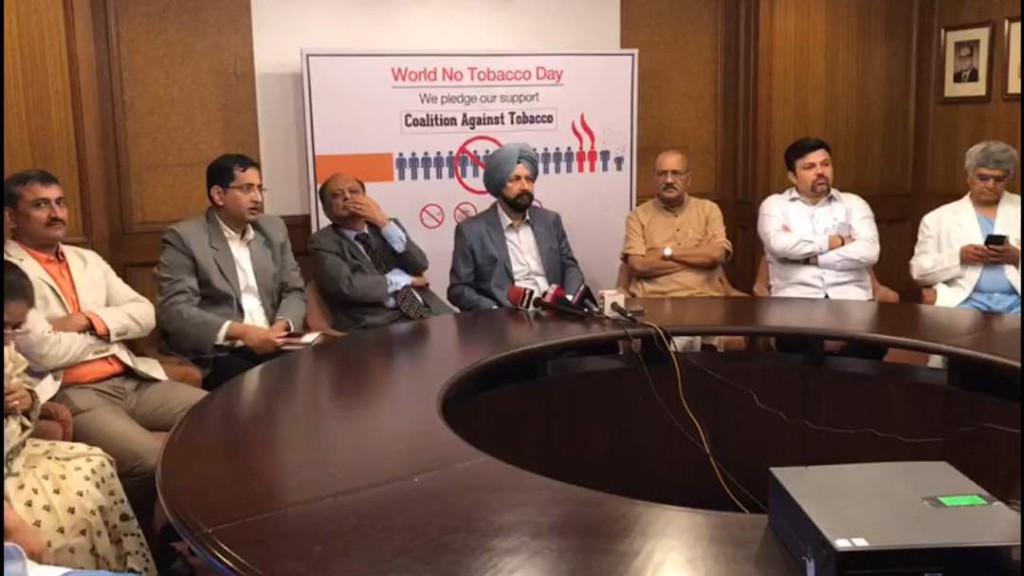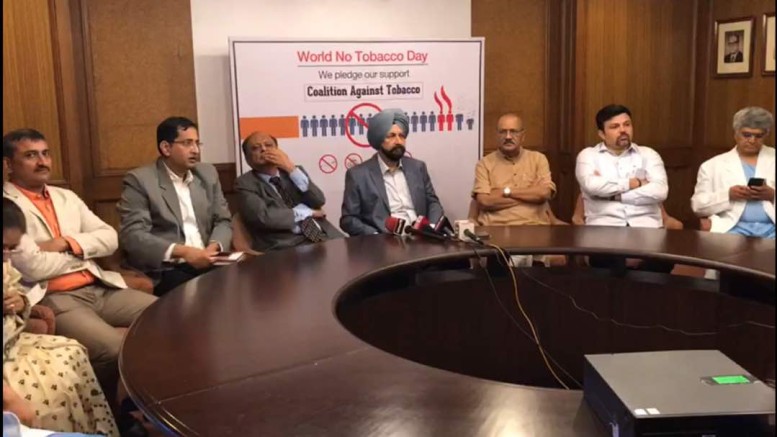Launch of Coalition Against Tobacco on
“World No Tobacco Day 2017”
Date 30th May, 2017
Venue – Tata Memorial Hospital, Mumbai

A panel of eminent personalities addressing the media after the launch of ‘Coalition Against Tobacco’.- Photo By Sachin Murdeshwar GPN NETWORK.
Mumbai, 29 May, 2017 (GPN): As the world gears up to observe No Tobacco Day, over 40 NGOs and several eminent personalities from India with strong support from the Tata Memorial Hospital, Mumbai came together to systemically address the menace of tobacco in our society and reduce its consumption in the interest of public health and welfare. The event and the discussions served to highlight the health and additional risks associated with tobacco use, and advocate for effective policies to reduce tobacco consumption.
This year’s theme, “Tobacco – a threat to development.” specifically highlighted the links between the use of tobacco products, tobacco control and sustainable development. Tobacco control has been enshrined in the Sustainable Development Agenda and it is seen as one of the most effective means to help achieve SDG target 3.4 of a one-third reduction globally, by 2030, of premature deaths from all non-communicable diseases (NCDs).
In India, there are 27.5 crore tobacco users which effectively means that every third Indian uses some form of tobacco. More than 33% of such users die a premature death due to cancer, heart attack, lung diseases, stroke, etc. A smoker loses 8 years of his life due to this addiction.
“Tobacco is responsible for nearly 50% cancers in India and 90% of mouth cancers. Half of the mouth cancer patients die within 12 months of diagnosis. As per WHO, tobacco addiction is a disease. Every third adult Indian is suffering from a serious disease.” said Dr. Pankaj Chaturvedi, Professor and Surgeon, Tata Memorial Hospital, Mumbai.
About 10 lakh Indians die from tobacco-related diseases each year in India. It is alarming that 4% of children aged 13-15 smoke cigarettes and 12% use some form of tobacco. The total economic costs attributed to tobacco related diseases in India in the year 2011 for persons aged 35-39 amounted to INR 104,500 crores (US$ 22.4 billion). This cost only keeps increasing with each passing year.
Commenting on the gravity of the situation that arises out of use of tobacco Dr Vijay Satbir Singh, ACS Public Health Department said “Tobacco is one of the major causes of death and disease in India, accounting for nearly 0.9 million deaths every year. Tobacco use is a major risk factor for many chronic diseases including cancer, lung diseases, cardiovascular diseases and stroke. India is the second largest consumer and third largest producer of tobacco and a plethora of tobacco products are available at very low prices. This needs to change”
“Tobacco use costs national economies enormously through increased health-care costs and decreased productivity. It worsens health inequalities and worsens poverty, as the poorest people spend less on essentials such as food, education and health care” said Dr Badwe, Director Tata Memorial Hospital, Mumbai
To mark the occasion of World No Tobacco Day, several luminaries sent personal messages endorsing the need for effective action to control tobacco:
Commenting on the gravity of the situation brought about due to higher tobacco consumption Devendra Fadnavis, CM Maharashtra said “Maharashtra is one of the worst tobacco affected states. The State Government has taken a lead in tobacco control with several firm steps such as ban on e-cigarettes and scented products, but there is a long way to go before we rid the state of this disease. We are aiming to become a model for tobacco control over the next few years and the support of civil society organisations will be critical in achieving this goal. This coalition is the first step towards that goal and I am sure with all these names associated with this cause a difference is just around the corner. State Government extends complete support for this mission.”
Ratan Tata, Chairman of Tata Trusts said,“Many non-communicable diseases are attributable to tobacco addiction. Tata Trusts fully supports the Government’s efforts to control this social evil. It upsets me to see sole bread winners of families falling prey to this menace. While we have done our best to augment cancer care in India through various initiatives, the need of the hour is to lay greater emphasis on cancer prevention and early detection. It is better to prevent tobacco addiction and related diseases as it will enable India to reduce the cost of healthcare and increase overall productivity. I take this opportunity to congratulate every individual and organization that has come together to work on this important cause of making India “tobacco free” before 2030.”
Mukesh Ambani, Chairman, Reliance Industries, said “I am deeply saddened to see so many instances of cancer in India due to consumption of tobacco. As a country we need to educate all Indians on the ill-effects of addiction to any form of tobacco. My best wishes to the organisers and participants and I hope that their efforts in cancer prevention and education on tobacco addiction will help reduce the incidence of cancer. ”
Commenting on the initiative, Shobana Kamineni, Executive Vice – Chairperson, Apollo Hospitals and President, CII said, “By 2020, India will have the largest incidence of heart disease. There are nearly one million tobacco deaths in the country every year. Now more than ever, there is a dire need to take critical measures to reduce tobacco consumption in India. Any form of tobacco including e-cigarettes, low tar etc. is harmful so it is important to spread awareness on the risks of tobacco. By saying no to tobacco, let us pledge for a tobacco-free India and safeguard our best asset – our health.”
The ‘Coalition against Tobacco’ was also forged at the WNTD event – a group of over 40 like-minded organisations that will work together to control the menace of tobacco consumption in the country.”Ends.
List of Participating Organizations –
1. ACI India
2. Action Council Against Tobacco, India (ACT India)
3. Anay Foundation
4. Brahma Kumaris, Mumbai
5. Cancer Patient Aid Association
6. Caring Friends
7. Cipla Foundation
8. Doctors For You
9. Don Bosco Balprafulta
10. Fortis Hospital, Gurugram
11. Healis, Navi Mumbai
12. Indian Academy of Oral Oncology
13. Indian Cancer Society
14. Indian Dental Association
15. Jagruti Sanstha, Thane
16. Jamaat -e- Islami Hind Organization
17. Janiv Samajik Sanstha, Thane
18. JASCAP
19. Kripa Foundation
20. Lifeline Express
21. Maharashtra Cancer Warriors
22. Maharashtra Nasha Bandi Mandal
23. Max Hospital, Delhi
24. Mumbai Sarvoday Mandal Organization
25. Mumbai Smiles Foundation
26. Mumbai University Social Work Department
27. Narayana Hrudayalaya, Kolkata
28. Narotam Sekhsaria Foundation
29. National Addiction Research Center
30. Nehru Yuva Kendra Sangathan, Mumbai
31. No Tobacco Association, Nagpur
32. PATH organization
33. Prevention of Addiction Through Children’s Education, Pune (PACE)
34. Prose Consulting LLP
35. Public Health Department, Government of Maharashtra
36. Salaam Bombay Foundation
37. Sambandh Health Foundation
38. SEARCH, Gadchiroli
39. Shraddha Foundation
40. Tata Memorial Hospital
41. Tata Trusts
42. V Care
43. Vital Strategies
44. Voice of Tobacco Victims (VoTV)
45. World Health Organization (WHO)
—————————-@-@————————
About ‘Coalition against tobacco’
This is a coalition of 40 NGOs and several eminent personalities who have joined hands to systemically address the menace of tobacco in our society and reduce its consumption in the interest of public health and welfare.
Action items for the coalition –
1. Endeavor to reduce tobacco consumption.
2. Assist Ministry of Health in achieving effective tobacco control in India.
3. Create a platform to bring together a diverse group of NGOs with varying strengths to accomplish the above goals.
4. Empower different verticals of government of India (education, police, finance, labor etc.) to perform their respective roles.
5. Establish a network of national and international experts to develop innovative, effective and sustainable strategies.
6. Organize a research team for periodic monitoring and evaluation.
7. Offer guidance and technical assistance to all individuals and NGOs in their fight against tobacco.
8. Sensitize and involve other important stakeholders such as media, lawyers, religious leaders, celebrities, etc.
9. Build the capacities of individuals (doctors, activists, cancer survivors, public health experts etc.) for effective advocacy.
10. Create a web based resource center containing all information and materials required for tobacco control campaign
—

